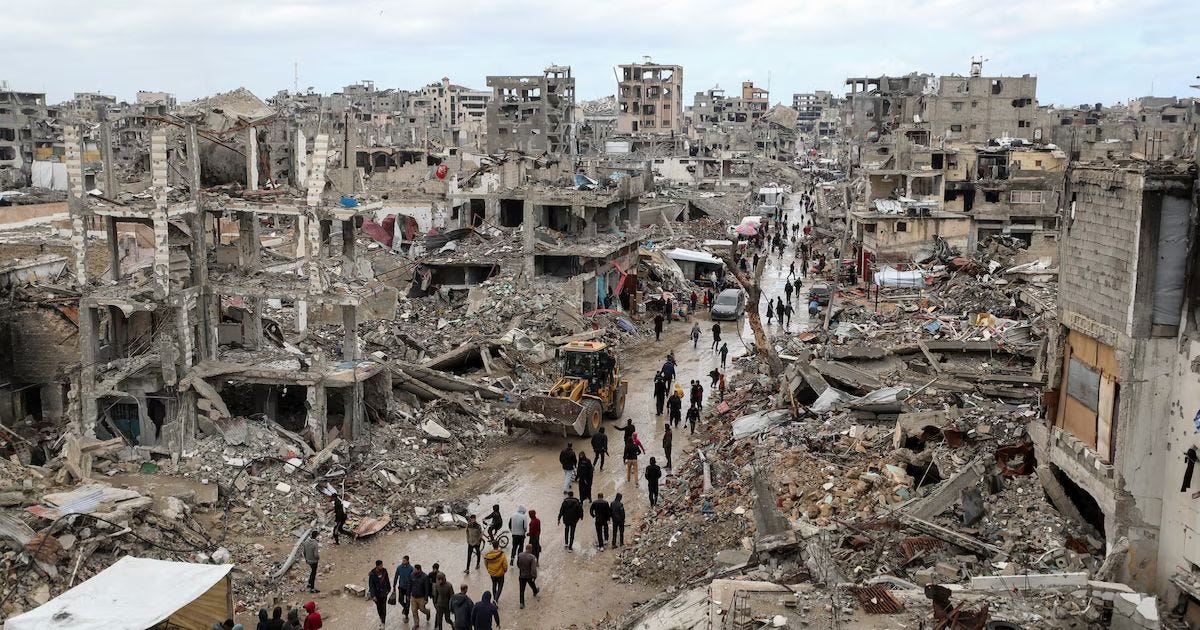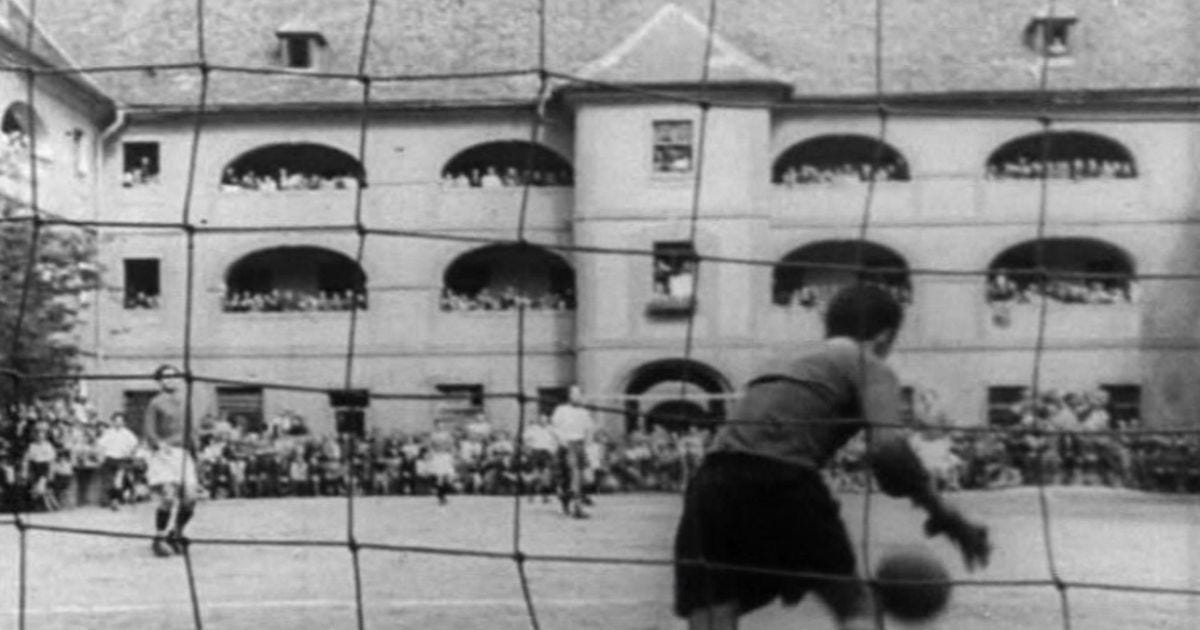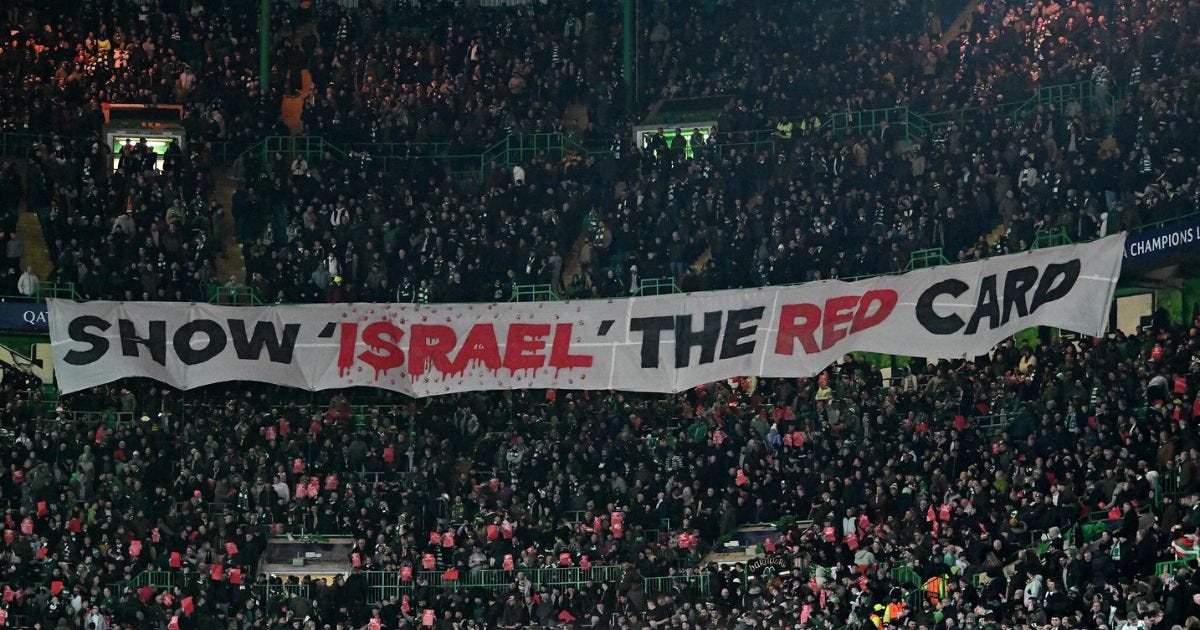Red Cards for Russia, Free Passes for Israel: The Hypocrisy of Football
In the world of football, governing bodies like FIFA and UEFA claim to stand above politics, united by the spirit of fair play. But recent global events tell a different story.
Football has long been hailed as the world’s game - a universal language of bridging cultures, crossing borders, and fostering unity. But history has shown, it is also a mirror of political power. From Nazi Germany’s use of sport for Aryan propaganda to the modern phenomenon of sportswashing by authoritarian regimes, football is deeply entangled with global politics whether we want it to be or not.
Today, one of the most pressing and contentious examples of this entanglement lies in the stark hypocrisy between how FIFA and UEFA responded to the war in Ukraine and what Israel is doing to Palestinians and has been doing since the 1940s.
In 2022, following Russian’s invasion of Ukraine, UEFA and FIFA took the unprecedented action to ban Russian national and club teams from all competitions. Yet despite mounting evidence of war crimes, apartheid policies, and the destruction of civilian infrastructure in Gaza and the West Bank, Israel continues to enjoy full participation in international football, including UEFA competitions.
Football and Political Power
Football is often romanticised as a cultural leveller, a global game that transcends politics. Yet, football has served as a powerful vehicle for political messaging and ideological warfare. Few examples illustrate this more starkly than Nazi Germany in the 1930s and early 1940s, where football was transformed into a tool of state propaganda and social control.
Under Nazi rule, Germany systematically co-opted all aspects of public life, and sport was no exception. The German Football Association was brought into alignment with Nazi ideology, with Jews being purged from clubs, federations, and the national team. Jewish clubs were banned outright. This exclusion of the Jews from football mirrored broader social ostracisation and dehumanisation that was central to Nazi policies. These purges weren’t just administrative, they also served to symbolically erase Jewish presence from the country’s most popular cultural institution.
The Nazis understood the immense power that football is as a propaganda tool. One of the most notorious examples occurring at the Theresienstadt concentration camp, where the SS staged football matches to deceive Red Cross inspectors into believing prisoners were being treated humanely. These matches were part of a wider propaganda campaign to manipulate and present a false sense of normality while concealing mass atrocities.
On the international stage, the 1936 Berlin Olympics is the more famous example of Nazi sports propaganda, but football, more deeply ingrained in German daily life, was arguably more potent. Stadiums were adorned with swastikas, and matches became ceremonies of national pride and racial superiority. Football was being used to reinforce the myth of Aryan dominance and national unity at a time when the regime was engineering societal division and extermination.
The weaponisation of football by the Nazis highlights the truth - that the game is never and has never been apolitical. Football reflects the values and hierarchies of the societies in which it operates. When those in power seek to control narratives, football often becomes a theatre for political performance. Whether through symbolic gestures, curated spectacles, or outright manipulation, football has long been a platform for advancing the ideologies of regimes across the world.
This legacy reverberates today in more subtle but equally significant ways. Modern authoritarian regimes invest heavily in football to burnish their reputations, distract from domestic repression, and present a global image of strength and normalcy. From Vladimir Putin’s hosting of the 2018 World Cup to Qatar’s sportswashing efforts, football has become a diplomatic asset.
The United States offers another example of how football is increasingly drawn into broader political narratives. As the country currently hosts the Club World Cup and prepares to co-host the 2026 FIFA World Cup alongside Canada and Mexico, its political climate is under worldwide scrutiny. President Trump has consistently used nationalist and exclusionary rhetoric reminiscent of Nazi propaganda. His calls to ban immigrants, restrict press freedom, and promote ‘American First’ policies have clear comparisons to the fascist playbook - including the manipulation of national culture, sport, and public spectacle - did you see the military parade to celebrate his 79th birthday the US Army’s 250th birthday!
The World Cup in America will almost certainly become a site of soft-power projection and ideological messaging, as ICE agents parade among the throngs of international football fans like goose stepping Sturmabteilungs [Brownshirts] from the 1930s. The World Cup will offer Trump an unprecedented stage to further shape both America’s identity and it’s international perception.
The intersection of football and political power is an ongoing and evolving reality - whether under Nazi rule, Putin’s Russia, or a polarised and potentially reactionary America. Recognising these patterns is essential if football is to resist being weaponised for propaganda and maintain its role as a truly global game.
The Sanctions on Russia that Set a New Standard
When Russia invaded Ukraine in February 2022, FIFA and UEFA acted with unprecedented speed and severity. Within days, both organisations suspended Russian national teams and club sides from all international competitions. UEFA also stripped Russia of its hosting rights for the Champions League final and other scheduled events. These decisions signalled a major departure from FIFA’s long-standing claim of political neutrality.
The response was swift, unified, and widely praised by Western governments. It reflected a rare moment of moral clarity in international sport — a recognition that aggressive war, violations of sovereignty, and mass civilian displacement could not go unpunished. But the firmness of this response also raised questions: would such measures be applied to other conflicts, other occupations, other violations of international law?
Several key dynamics shaped the decision to sanction Russia:
Geopolitical alignment: UEFA is a European organisation, and Russia’s invasion occurred on European soil. Ukraine enjoys broad support among European governments, whose national associations hold significant influence within UEFA. In many ways, UEFA’s institutional interests aligned neatly with Western political sentiment.
Ukrainian diplomacy and visibility: Ukraine’s leadership launched an effective international campaign to highlight Russian aggression to seek sympathy and support. Ukrainian footballers, celebrities, and political figures issued emotional appeals that were amplified across media platforms, creating an overwhelming sense of urgency.
Media framing and public perception: Western media outlets framed the invasion in stark, unambiguous terms: Russia was the aggressor, Ukraine the victim. Images of bombed cities, fleeing civilians, and injured children flooded television and social media. In this environment, FIFA and UEFA faced immense pressure to act - not just from governments, but from the public and the footballing world at large.
National and grassroots activism: Football associations across Europe - including England, Poland, and Sweden - declared they would refuse to play Russia in scheduled fixtures. Clubs such as Schalke 04 severed sponsorship deals with Russian companies. Fans staged protests in stadiums. This bottom-up pressure made continued engagement with Russia untenable.
The sanctions against Russia set a powerful precedent. For the first time, a major global power was expelled from international football because of its foreign policy actions. FIFA and UEFA positioned themselves as moral arbiters, ready to uphold international norms.
However, this new standard quickly revealed its limits. While the invasion of Ukraine was condemned as a breach of international law, similar or worse actions by other states - most notably Israel - have not triggered comparable responses. Instead, FIFA and UEFA have reverted to a cautious, non-interventionist stance, raising huge questions about their consistency, credibility, and political bias.
Ultimately, the Russia-Ukraine case showed what was possible when the political will existed. It demonstrated that football’s governing bodies could respond decisively to injustice. But it also laid bare the hypocrisy of selective enforcement - a theme that haunts FIFA and UEFA’s reputation.
Israel, Palestine, and the Absence of Accountability
Despite decades of violent occupation, massacres, mass kidnapping and targeting of children, and apartheid policies documented by organisations such as Amnesty International, Human Rights Watch, and the United Nations, Israel continues to enjoy full participation in international football, Israeli clubs continue to play in UEFA competitions, and the national team competes without restriction. Unlike Russia, whose invasion of Russia prompted swift global condemnation and sanctions, Israel has faced virtually no sporting repercussions for its war crimes in Gaza and the West Bank - even the attacks against Lebanon, Syria, and now Iran.
This absence of accountability speaks to a complex web of political influence, bribery, media bias, and institutional reluctance to challenge powerful Western allies. Israel’s close relationship with the United States and many European nations creates a protective shield against international scrutiny. In football, this translates into immunity from the kind of sanctions imposed on other states.
Palestinian football has suffered immensely under the occupation. The Palestinian national team and domestic clubs face extraordinary obstacles: players are frequently denied travel permits, facilities are destroyed in military operations, and footballers have been detained (and tortured), injured, and even killed by Israeli forces. The Palestinian Football Association (PFA) has repeatedly appealed to FIFA to take action against Israel, citing violations of international law and FIFA’s own statutes, which prohibit discrimination and political interference. Yet, these appeals have gone largely ignored, delayed indefinitely, or have been dismissed as too controversial.
The selective silence from football’s governing bodies underscores a troubling pattern. When political pressure aligns with Western narratives, as it did with Ukraine, decisive action follows. But when the victims are Palestinians, there is reluctance to act - images of murdered innocent men, women, and children only matter when they are European or White! This also clearly reveals the influence of Pro-Israeli lobbying networks and media framing.
Pro-Israeli and Zionist advocacy groups, particularly in the United States and Europe, exert significant influence in political and media circles. These groups help frame Israel’s attacks as defensive, while portraying Palestinian resistance - whether violent or nonviolent - as illegitimate and criminal. This framing shapes public opinion and, by extension, the political will of football associations.
The same tactics were used by the Nazis and its puppet Vichy government in France during the Second World War, as they actively worked to discredit and criminalise the French Resistance. Portraying them as bandits, criminals, and terrorists - while promoting the Vichy regime as the authority upholding law and order. This rhetoric was used to undermine the Resistance’s legitimacy, discourage public support, and justify crackdowns on resistance activities - they have clearly learned from the Nazis - with the Zionist leaders using the past suffering of Jews as something from which they could make useful political capital from.
Do oppressed people not have the right to fight their oppressors? If they don’t then we wouldn’t have the United States of America, the Republic of Ireland, and many more independent nations worldwide. So why is it not right for Palestinians to fight for their freedom and Israel to oppress, dehumanise, and murder them?
FIFA and UEFA, like many international organisations, are susceptible to these political currents. Despite their official claims of neutrality, their decisions reflect the power dynamics of the international order. The refusal to hold Israel accountable for its actions in Palestine is not an oversight - it is a calculated silence rooted in political interests, media narratives, and pro-Israel lobby groups whispering sweet nothings into the ears of top officials from both organisations.
Until football’s governing bodies apply their principles consistently, the sport will continue to serve not as a unifier but as a tool of selective justice. For the millions of Palestinian fans and athletes denied the basic right to play, the beautiful game remains another arena of exclusion and inequality.
Lobbying, Influence, and Strategic Alliances
At the heart of FIFA and UEFA’s double standards lies the powerful role of lobbying and strategic alliances. While football may claim to exist above the trials and tribulations of world politics, the sport’s governing institutions are heavily influenced by political networks, economic interests, and soft power relationships.
Pro-Israel lobbying groups, especially those operating in Western Europe and the United States, wield substantial influence over political discourse and public sentiment. These organisations have successfully shaped narratives around Israeli security, framing critiques of the occupation or military actions as inherently antisemitic and politically motivated. This makes it extremely difficult for public figures, let alone football institutions, to call for sanctions or accountability without facing intense backlash.
The relationship between Israel and UEFA itself is the result of political strategy. After being expelled from the Asian Football Confederation (AFC) in the 1970s due to political pressure from Arab and Asian nations - most notably Kuwait and North Korea who refused to play against them - Israel joined UEFA in the 1990s. This move offered not only competitive football opportunities but also political protection - inclusion in European football meant less scrutiny over its regional conduct.
The role of corporate and broadcast partners also cannot be understated. Sponsorship deals, broadcast rights, and media narratives are intricately tied to how conflicts are perceived. In the case of Russia’s invasion of Ukraine, Western media outlets united in their condemnation, fuelling widespread public outrage that in turn compelled football institutions to act. In contrast, coverage of Israeli military actions is far more fragmented and controversial, often couched in the language of ‘security’ and ‘self-defence’ rather than what they are war crimes and genocide. Media normalisation of Israeli policies, combined with lobbying influence, insulates the country from the kind of scrutiny that prompted action against Russia. And given FIFA’s history of corruption - you can’t ignore the hint of impropriety with bribes and backhanders being received.
Some of football’s most powerful commercial stakeholders have vested interests in maintaining strong ties with Israel and its allies. American and European corporations involved in the sport often have wider political and economic considerations. Sanctioning Israel would risk alienating influential governments, major donors, and segments of the fanbase - risks that FIFA and UEFA are clearly unwilling to take.
Even within the footballing community, influential voices tend to shy away from criticising Israeli policies. Unlike Ukraine, where top players, coaches, and national federations voiced solidarity and demanded action, there is a striking silence when it comes to Palestine. Those who do speak out - such as a handful of players who have displayed Palestinian flags or supported the Palestinians - are often punished or accused of politicising sport.
FIFA and UEFA operate within an ecosystem that discourages action against Israel - not necessarily due to impartiality, but due to the strategic political wheeling and dealing of international relations.
Ultimately, the selective enforcement of human rights standards in football reflects deeper inequalities. Nations with stronger lobbying capacity, deeper strategic ties to the West, and more effective media operations are often shielded from accountability and their crimes ignored.
The Precedent of South Africa
For decades, the apartheid regime of South Africa was excluded from international sporting competitions as a direct response to its racial segregation policies and institutionalised discrimination against the Black population. The sporting boycott was not merely symbolic; it was one of the most visible and effective levers used by the international community to isolate the apartheid regime and signal global moral opposition - ironically, Israel was one of the apartheid regimes closest allies during this time.
South Africa was first suspended from FIFA in 1961 due to its refusal to field racially integrated teams. The country was formally expelled in 1976, and were only reinstated after apartheid was dismantled in the 1990s. During this time, athletes, sports federations, and civil society organisations across the world rallied in support Black South Africans.
Further highlighting the sheer hypocrisy of FIFA and UEFA’s current inaction on Israel. The case of South Africa demonstrates that sporting organisations are capable of taking principled stands against state-sponsored discrimination and violence. The anti-apartheid movement within sport was effective precisely because it rejected the notion that sport exists in a vacuum, detached from political and moral realities.
Critically, the success of the South African boycott was not predicated on media spin or Western political calculations. It emerged from grassroots activism, pressure from within the sporting world, and an overwhelming global consensus that apartheid was a moral outrage. Countries across Africa, Asia, and Latin America demanded South Africa’s exclusion, and eventually European nations followed in the face of sustained pressure.
Today, many argue that Israel’s occupation of Palestine, its two-tier system, and policies in the occupied territories constitute an apartheid regime - which is supported by leading human rights organisations such as Amnesty International, Human Rights Watch, and B’Tselem. Yet, despite this, FIFA has refused to take comparable action. The same moral clarity that guided decisions in the case of South Africa has been conspicuously absent when dealing with the Zionist regime.
If apartheid was enough to justify a sporting boycott in the 20th century, why is a similar standard not being applied now in the 21st century? Are some forms of racial segregation and systemic oppression more acceptable to UEFA and FIFA than others? The legacy of the South African boycott reminds us that sport can be a powerful force for justice, but only when institutions are willing to confront their own complicity and abandon selective enforcement.
The precedent of South Africa offers not just a historical comparison, but a challenge to the present. It exposes how the principles of fairness, human rights, and moral responsibility can be upheld, if there is the political will to do so. For FIFA and UEFA, it is a clear indication that they are not the guardians of the game, but merely instruments of political convenience.
Sport as Propaganda: From Nazi Germany to the Zionist State
The use of sport as a vehicle for propaganda is not new. In fact, football has long been a tool wielded by states and regimes seeking to shape global perceptions, bolster national identity, and obscure oppressive policies. The Nazis were first to use Sport as a propaganda tool as I mentioned earlier in this article.
In the modern era, authoritarian and semi-authoritarian states have refined these tactics. Nations have used tactics to use high-profile sporting events or affiliations to rehabilitate their global image. Countries such as Qatar, Saudi Arabia, and Israel have heavily invested in football to this end, leveraging football’s global appeal to soften perceptions of their domestic or foreign policies.
Israel has used football strategically to promote a sense of normality and global integration. The country has hosted international tournaments, fostered partnerships with European football clubs, and built public relations campaigns around its national teams. These efforts aim not only to sell Israel as a modern and inclusive democracy but also to sportswash their ongoing human rights violations, military actions, and war crimes in the occupied Palestinian territories.
Israel’s inclusion in UEFA rather than the Asian Football Confederation has allowed it to participate in competitions that reach vast Western audiences, further aligning Israel with the West while distancing it from regional disputes with the Arab nations around it. Additionally, high-profile friendlies with European clubs, joint training sessions, and football development programs in Africa and Asia serve to boost Israel’s reputation on the international stage.
This mirrors the approaches taken by Qatar and Saudi Arabia, who have poured billions into football — purchasing clubs, hosting World Cups, and creating media empires in an attempt to deflect attention from issues like migrant worker exploitation, the suppression of opposition activists, and human rights violations. In each case, football becomes not just a sport, but a stage-managed spectacle used to obscure inconvenient truths.
Football evokes passion, loyalty, and tribal identity - all qualities that are easily manipulated for political ends. When a state is able to harness that emotional energy, it can transform criticism into admiration and distract attention from more troubling realities.
The complicity of football institutions in these strategies is deeply concerning with FIFA and UEFA’s embrace of countries and clubs tied to political agendas reveals a willingness to trade ethics for revenue, access, and influence.
Accountability or Hypocrisy?
FIFA and UEFA’s selective application of political standards has laid bare the illusion of neutrality in global football governance. The swift and decisive sanctions against Russia were presented as a moral imperative - a stand for human rights, territorial integrity, and international law. But the continued inclusion of Israel, despite its war crimes and ongoing genocide in Gaza, reveals that these principles are applied politically.
This double standard undermines not only the credibility of FIFA and UEFA but also the broader message that sport can be a force for good. When rules are bent or ignored based on political alliances, lobbying pressure, economic interests, or the colour of the skin of the victims, justice becomes erratic. The result is a hollowed-out form of ethics - one that condemns some aggressors while excusing others, depending on political and financial convenience.
Football's reach and influence mean it has immense potential to drive awareness and accountability. When governing bodies act courageously, they can become agents of change. But when they shield certain nations from scrutiny while punishing others, they become complicit in the very crimes they claim to oppose.
The path forward requires more than symbolic gestures or reactive politics. It demands consistent standards, independent enquiry mechanisms, and a willingness to confront uncomfortable truths. FIFA and UEFA must cut themselves free from lobbying pressure and ensure that human rights, not just financial interests, guide their decision-making.
Until then, the claim of neutrality in football will remain a convenient fiction - a shield for hypocrisy rather than a platform for fairness.









True,true,true..
Celtic football club where punished with a £28,000 fined for its fans displaying banner, SHOW ISRAEL THE RED CARD